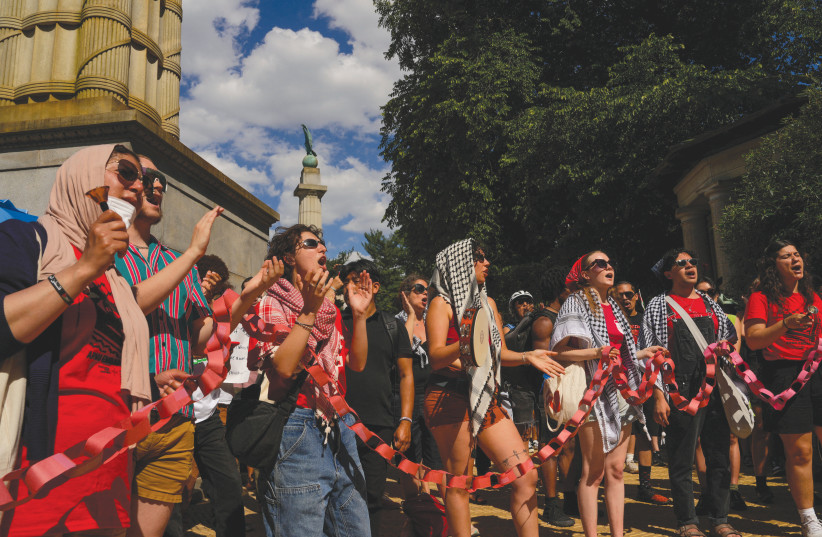IF YOU are dismayed by Jerusalem’s changing skyline, which now prevents you from seeing all the way to Jordan from certain parts of the city, be aware that it’s going to get worse before it gets better, if it ever does.
Two weeks ago, the Association of Builders of Jerusalem and Environs elected a new chairman, Ilan Gordo, a veteran construction contractor who aims to bring Palestinian building laborers back to Jerusalem to speed up the construction of new projects. Gordo, who succeeded Boaz Israeli after the latter spent a decade in the post, will make sure that every Palestinian worker is thoroughly checked before receiving security clearance. With substantial additions to the workforce, many projects well behind deadline will be completed within months. By then, views of just about anywhere – not just Jordan – will be obscured by ever higher towers.
Donors dropping top universities due to antisemitism
AMONG THE Jewish philanthropists who have struck Penn University off their list is computer scientist David Magerman, who specializes in artificial intelligence (AI). Moreover, on social media he has urged fellow Jewish philanthropists to redirect their donations from “encampment-infested” American colleges to academically strong and antisemitism-free Israeli universities.
Magerman and wife, Debra Magerman, in partnership with their Israeli Tzemach David Foundation, have donated $1 million to the Jerusalem College of Technology (JCT). The donation is earmarked for the expansion of JCT’s International Program for English speakers, which combines academic and Torah studies with Religious Zionist values and empowers students to integrate quickly into Israeli society. In their first two years, they also study in an ulpan. By their third study year, students transition to Hebrew-language courses, making them better equipped to join the Israeli workforce.

JCT president Prof. Chaim Sukenik lauded the Magermans for choosing to invest in Israel’s future through education, for which they have a declared passion.
Aside from considering an Israeli educational option due to rising antisemitism in America, many parents are also attracted to Israeli schools, colleges, and universities because their cost is a fraction of what they would have to pay in similar institutions in America.
Impacts of the war
HOW JERUSALEM business has been affected by the war is the theme of a conference that will be held in the auditorium of the Friends of Zion Museum (FOZ) on Sunday, June 30. FOZ has become a very popular meeting place, which does not seem to suffer competition from the Museum of Tolerance across the road. Part of the reason for FOZ’s popularity is that friendly staff are always on hand to direct people to where they want to go in the complex, walk them to the elevator, press the right button, etc.
Even though it is not a Jewish organization, FOZ runs a kosher dairy kitchen from which the buffet for conference participants will be supplied. The conference begins with mingling and eating at a 6:30 p.m. reception. Speeches begin at 7:30 p.m. Several Knesset members will be in attendance as will Energy and Infrastructure Minister Eli Cohen and, of course, Jerusalem Mayor Moshe Lion.
Also present will be veteran businesspeople, such as Arieh Wisman, chairman of the Wisman Furniture Group founded in 1932 by his father Leo Wisman, a master craftsman; Meir Micha, owner of the legendary Pinati Restaurant, which more than 30 years ago started out as a worker’s canteen and has grown into a chain that extends beyond Jerusalem; and Rami Levy, arguably Jerusalem’s most widely known businessman whose interests include discount supermarkets, real estate, communications, tourism, and finance. Though no longer deputy mayor, Fleur Hassan-Nahoum has indicated she will be there as well.
Admission is free of charge, but registration is required at lahav.org.il
Community rabbis
THE CONTROVERSY over community rabbis is still brewing. Part of the reason is that secular Jews or those who consider themselves Jewish but may not be so according to Halacha are fed up with having their lives controlled by the Rabbinate. On the other hand, even the most secular of Jews may need to consult a rabbi on certain life cycle matters such as the burial of a relative, a bar mitzvah, or a problem of another kind.
Aish HaTorah has started an online chat service staffed by ordained rabbis, who in some cases have become a lifeline for unaffiliated Jews and disconnected Jews worldwide. Aish.com’s live web chat service, which allows anyone to chat directly with one of the organization’s leading rabbis, has seen a staggering 300% increase in usage since Oct. 7.
What began as a helpful online outreach effort has quickly become a lifeline, with over 5,000 chat responses each month – more than 225 per day. Many of these chats blossom into extended conversations, guiding inquirers on substantive journeys to reclaim their Jewish identities and connect with other Jews.
“We’re hearing from so many Jews who feel profoundly disconnected, whether due to living in areas with little Jewish community or lack of affiliation growing up,” said Rabbi Tzvi Broker, who oversees Aish.com’s Live Chat. “The personal nature of these interactions, coupled with their anonymity, creates a safe space to ask questions and begin exploring. Having a live rabbi to connect and share with has been a draw for many, and we’re seeing lives transformed as a result.”
Many of those who have sought to chat with a rabbi are looking for spirituality. Some want to reclaim their heritage and identities, while others are looking to connect with fellow Jews.
Changes in social interaction, due in no small measure to technological developments, have led to increasing isolation, with individuals losing the gift to communicate. That isolation which may have initially been regarded as privacy has evolved into loneliness in an era in which Jews and Israel are constantly targeted for ridicule and violence.
This situation is prompting Jews to seek out fellow Jews, and prompting Israel to develop closer relationships with Jewish communities in the Diaspora.
greerfc@gmail.com
